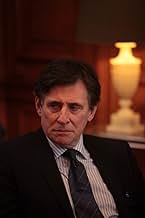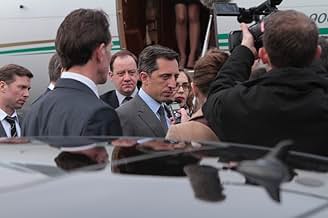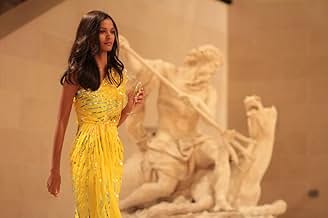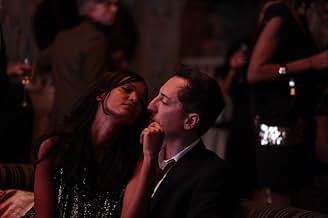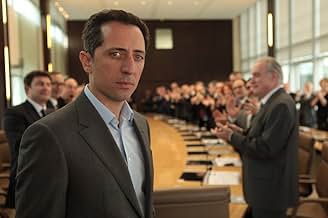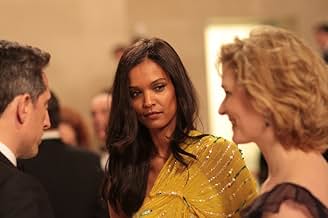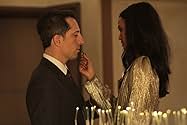NOTE IMDb
6,5/10
5,8 k
MA NOTE
Le nouveau PDG d'une grande banque d'investissement européenne s'accroche à son siège lorsqu'un fonds spéculatif américain tente de racheter sa société.Le nouveau PDG d'une grande banque d'investissement européenne s'accroche à son siège lorsqu'un fonds spéculatif américain tente de racheter sa société.Le nouveau PDG d'une grande banque d'investissement européenne s'accroche à son siège lorsqu'un fonds spéculatif américain tente de racheter sa société.
- Réalisation
- Scénario
- Casting principal
- Récompenses
- 1 victoire et 2 nominations au total
Avis à la une
Let's continue to rob the poor and make the rich richer!" this is what about the modern day banking and financing (undre)world, banks are just like Mafia, bankers Mafiosos, banks' CEO in private jet doing country hopping, hiring retired cop to do the dirt-digging and trashcan/dumpster diving jobs, committing some adultery flirting with high priced model- hooker, back-stabbing while self defense, behind the door deals, estranged to parents, wives, kids, fence off hostile takeover, firing the employees as many as possible, no gender and age are safe, laying off more, the stockholders will be happier and the stock will be rocketing. so, indeed "money is not a tool but a master, serving him well and he'll reward you generously". so let's continue to rob the poor blind and serve the rich loyally. what a great movie, very tense and thrilling, great montage, lot of exotic locations in different countries. this is a very nicely done movie, quite worth watching.
LE CAPITAL, (French) director Costa-Gavras, starring Gad Elmaleh, with Gabriel Byrne. Viewed at the 2013 Los Angeles Film Festival. Costa-Gavras' "Le Capital" is extremely glossy (in the good sense of the word) and an extremely penetrating high-end study of the workings of international Banking Conglomerates, in short, another typical Costa-Gavras exposé of the evils around us that run our lives without our realizing it.
At the beginning of the film the powerful head of a gigantic French investment bank, Le Phenix, collapses on a golf course and is diagnosed with terminal cancer "of the balls" (says the subtitle) --i.e., the testicles. With the implication that financial power mongers have to trade in sexual potency for financial power we have the first hint of the implicit satire to come.
The moribund CEO, passing over old cronies and more obvious candidates for the post he is about to vacate, hand picks a company nobody, a young scholarly banker, Marc Tourneuil, to the position of president thinking he will be easily manipulated during a temporary transition period.
Marc, played forcefully by handsome Moroccan born actor Gad Elmaleh, (Casablanca, 1971) turns out to be nobody's patsy, starts firing people right and left, and is soon running the bank for his own personal gain with the old timers plotting fecklessly against him. He gets involved in a multinational hostile takeover scheme masterminded remotely over office television by a sinister smooth talking Englishman (Gabriel Byrne). On the way in a complex effort to destroy him he is set up with a slinky black supermodel (apparently modeled on obstreperous English supermodel Naomi Campbell) who gives him a hard time in London and Tokyo before he finally has to rape her in a stretch limo in New York to gratify his methodically frustrated lust.
At the very end he finesses all the insiders trying to double cross him by threatening to expose the whole deal which will send them all to jail for insider trading. The deal in question has forced the collapse of Phenix and the creation of a new successor entity. At the foundation board meeting where Tourneuil is of course named the new CEO he announces that as their own "Robin du Bois" (Robin Hood) he will continue to rob the poor so that they can get even richer. Wild cheering goes up all around the table as actor Elmaleh turns to the camera and tells us in the audience directly that this will keep going on as long as we let it go on. Perhaps not the most subtle way to end this awesome tale of financial exploitation and greed at the highest levels, but maybe subtlety is not enough to wake us up.
The real meat of the film is the brilliant way in which Gavras presents the life styles of the super-greedy rich both in the work place and in their social life. For one party scene he apparently rented the entire sculpture foyer of the Louvre, as realistically lavish a party as has ever been seen on screen. All the other scenes follow suite in this typically excellent Costa Gavras mise-en-scene, a visual pleasure all the way and a heady thriller to boot.
"Le Capital" was not a big hit in France when released in November and was met with mixed reviews on IMDb and elsewhere, but since Americans do not have the same expectations as the French "Le capital" may enjoy a better reception here than it had on home ground. Gad Elamleh, for example, is far better known in France as a stand up comedian than a movie actor and his interpretation of banker Marc Tourneuil has been called unrealistic, but to an American audience that has never seen him before he will come across as quite convincing -- a handsome cad you end up rooting for because the other people he is up against are so much more evil and disgusting than he is. If anybody out there thinks that Costa Gavras has "lost it" at age eighty (as some have said) I would say they have another thought coming. In any case, having Consantine Costa Gavras visit the City of Angels to present his latest film was a singular feather in the hat of Film Independent.
"Le Capital" will go on general release in this country in October and then we shall see what people here have to say.
At the beginning of the film the powerful head of a gigantic French investment bank, Le Phenix, collapses on a golf course and is diagnosed with terminal cancer "of the balls" (says the subtitle) --i.e., the testicles. With the implication that financial power mongers have to trade in sexual potency for financial power we have the first hint of the implicit satire to come.
The moribund CEO, passing over old cronies and more obvious candidates for the post he is about to vacate, hand picks a company nobody, a young scholarly banker, Marc Tourneuil, to the position of president thinking he will be easily manipulated during a temporary transition period.
Marc, played forcefully by handsome Moroccan born actor Gad Elmaleh, (Casablanca, 1971) turns out to be nobody's patsy, starts firing people right and left, and is soon running the bank for his own personal gain with the old timers plotting fecklessly against him. He gets involved in a multinational hostile takeover scheme masterminded remotely over office television by a sinister smooth talking Englishman (Gabriel Byrne). On the way in a complex effort to destroy him he is set up with a slinky black supermodel (apparently modeled on obstreperous English supermodel Naomi Campbell) who gives him a hard time in London and Tokyo before he finally has to rape her in a stretch limo in New York to gratify his methodically frustrated lust.
At the very end he finesses all the insiders trying to double cross him by threatening to expose the whole deal which will send them all to jail for insider trading. The deal in question has forced the collapse of Phenix and the creation of a new successor entity. At the foundation board meeting where Tourneuil is of course named the new CEO he announces that as their own "Robin du Bois" (Robin Hood) he will continue to rob the poor so that they can get even richer. Wild cheering goes up all around the table as actor Elmaleh turns to the camera and tells us in the audience directly that this will keep going on as long as we let it go on. Perhaps not the most subtle way to end this awesome tale of financial exploitation and greed at the highest levels, but maybe subtlety is not enough to wake us up.
The real meat of the film is the brilliant way in which Gavras presents the life styles of the super-greedy rich both in the work place and in their social life. For one party scene he apparently rented the entire sculpture foyer of the Louvre, as realistically lavish a party as has ever been seen on screen. All the other scenes follow suite in this typically excellent Costa Gavras mise-en-scene, a visual pleasure all the way and a heady thriller to boot.
"Le Capital" was not a big hit in France when released in November and was met with mixed reviews on IMDb and elsewhere, but since Americans do not have the same expectations as the French "Le capital" may enjoy a better reception here than it had on home ground. Gad Elamleh, for example, is far better known in France as a stand up comedian than a movie actor and his interpretation of banker Marc Tourneuil has been called unrealistic, but to an American audience that has never seen him before he will come across as quite convincing -- a handsome cad you end up rooting for because the other people he is up against are so much more evil and disgusting than he is. If anybody out there thinks that Costa Gavras has "lost it" at age eighty (as some have said) I would say they have another thought coming. In any case, having Consantine Costa Gavras visit the City of Angels to present his latest film was a singular feather in the hat of Film Independent.
"Le Capital" will go on general release in this country in October and then we shall see what people here have to say.
Very interested 2012 French film by Costa Garvas. Shows how a large French bank operates in the world's financial market and how it integrates into the international banking system. An aging CEO is replaced by a younger executive. He finds himself with a lot of internal and external pressures. Some scenes of it reminds of Wall Street 2. A different approach to the financial market at a fast pace, in some moments too fast to follow and grasp. Also shows the relationships between the different executives and its lower level employees when the new CEO starts laying off people to tune up the finances of the bank with ruthless practices and little concern about employees needs and their respect. Worth while seeing.
Marc Tourneuil (Gad Elmaleh) is an ambitious executive of the French Phenix Bank. When the CEO becomes incapacitated with cancer, he handpicks Tourneuil as the replacement CEO. He's surrounded by enemies. When he starts pushing to be more than a figurehead for the old CEO, he even loses that support. The only support comes from an American hedge fund minority shareholder Dittmar Rigule (Gabriel Byrne). The problem is that his support comes with strings attached. There is also underwear supermodel Nassim that has caught the eye of the married Tourneuil.
This starts off well. I like the corporate intrigue and the paranoid backstabbing. Some of the arguing from the wife and their family does border on naivety. I like the morally dubious protagonist better. However the movie slips as it tries to shoehorn a Hollywood happy ending. It would be better to keep a noir edge to the end. The last half has too many simplistic turns. I would be much happier with a murkier darker progression.
This starts off well. I like the corporate intrigue and the paranoid backstabbing. Some of the arguing from the wife and their family does border on naivety. I like the morally dubious protagonist better. However the movie slips as it tries to shoehorn a Hollywood happy ending. It would be better to keep a noir edge to the end. The last half has too many simplistic turns. I would be much happier with a murkier darker progression.
Basically good, sympathetic, or at least, interesting characters, you can relate to and care for, encounter obstacles, have to struggle for a while, but ultimately find their way through an unfriendly or simply indifferent world. We all love this type of films. "Capital" is emphatically not one of those, but is nevertheless worthy of attention.
There is at least one character, however, who has not lost her moral compass, and still has some, albeit minuscule weight in the film: the wife of the main protagonist, a former economics professor, and now an ambitious CEO of a leading French bank. Her pull on her husband, however, is only marginally stronger than the one that his extended family, of apparently modest means, has on him. He has feelings for her, as well as for his parents, but those simply cannot compare in intensity to the thrill of money. He is a man who understands "the way the world functions", as he is not shy to explain when questioned. It is a game, in which, typically, rich get richer and poor get poorer, but the reverse is not impossible, as we are told, only improbable. He is cool, calculated, unemotional player, consciously going for high stakes. Just like the others, towards him often inimical characters, who he does not blame for their repugnant behaviour, although certainly would not mind occasionally smashing their heads onto hard surfaces nearby. Of course, we understand that he could not have possible been any different and still belong to the top executive branches of the financial world.
Costa Gavras made his name in the genre of international political thriller, picking his subjects to be the most promising themes for such a film at a given time. It is already telling that he chose the world of high finance, and not of politics, as the most relevant field today. Indeed, the main character is addressed always as "the president", and he is treated as such by everybody he meets. He clearly lives in an entirely different world from the majority of even western, relatively well-off humanity, and his decisions, although made explicitly and exclusively for the benefit of the few, indeed affect, thousands of ordinary mortals. The bank that he directs, and pretty much all the interiors he ever dwells in do not fall far behind many European royal palaces. His world is the world of excess, but in his book it should be unapologetically so.
There is a hint in the film of a possible difference between the old European, and the new aggressive, American business attitudes, that may exist only on the surface. American bankers that we meet maybe cannot pronounce Modigliani's name correctly, but they understand perfectly that their French counterparts are just as greedy, and motivated by the same basic predatory impulses, as they are. As the main character says on one occasion, almost defending his adversaries across the Atlantic: "They are just businessman, like us". The difference seems to be only that the French operate from the high-ceiling, well decorated, old world Parisian buildings, whereas their American partners for their machinations prefer flashy yachts and skyscrapers.
The film certainly lacks the depth and the emotion of the very best Gavras' works, such as "Z" or the "Missing", but it functions well at the level of well written, competently shot, and expertly directed financial drama. It is an insightful, if not too original, commentary on today's state of affairs which to many will ring painfully true. There are also some fairly obvious flaws: the parallel thread with the "super model" that the main hero relentlessly pursues is rather stereotypical, and her attitude towards him appears far-fetched. It would have served the story's development better if the relationship with the multi-dimensional French female employee from London's office was introduced earlier and then further developed. This could have added some intellectual and emotional depth to the main character, beyond what was this way left only sketched. These comments notwithstanding, the film presents an entertaining and informative look at the dynamics of the modern world's new nobility.
There is at least one character, however, who has not lost her moral compass, and still has some, albeit minuscule weight in the film: the wife of the main protagonist, a former economics professor, and now an ambitious CEO of a leading French bank. Her pull on her husband, however, is only marginally stronger than the one that his extended family, of apparently modest means, has on him. He has feelings for her, as well as for his parents, but those simply cannot compare in intensity to the thrill of money. He is a man who understands "the way the world functions", as he is not shy to explain when questioned. It is a game, in which, typically, rich get richer and poor get poorer, but the reverse is not impossible, as we are told, only improbable. He is cool, calculated, unemotional player, consciously going for high stakes. Just like the others, towards him often inimical characters, who he does not blame for their repugnant behaviour, although certainly would not mind occasionally smashing their heads onto hard surfaces nearby. Of course, we understand that he could not have possible been any different and still belong to the top executive branches of the financial world.
Costa Gavras made his name in the genre of international political thriller, picking his subjects to be the most promising themes for such a film at a given time. It is already telling that he chose the world of high finance, and not of politics, as the most relevant field today. Indeed, the main character is addressed always as "the president", and he is treated as such by everybody he meets. He clearly lives in an entirely different world from the majority of even western, relatively well-off humanity, and his decisions, although made explicitly and exclusively for the benefit of the few, indeed affect, thousands of ordinary mortals. The bank that he directs, and pretty much all the interiors he ever dwells in do not fall far behind many European royal palaces. His world is the world of excess, but in his book it should be unapologetically so.
There is a hint in the film of a possible difference between the old European, and the new aggressive, American business attitudes, that may exist only on the surface. American bankers that we meet maybe cannot pronounce Modigliani's name correctly, but they understand perfectly that their French counterparts are just as greedy, and motivated by the same basic predatory impulses, as they are. As the main character says on one occasion, almost defending his adversaries across the Atlantic: "They are just businessman, like us". The difference seems to be only that the French operate from the high-ceiling, well decorated, old world Parisian buildings, whereas their American partners for their machinations prefer flashy yachts and skyscrapers.
The film certainly lacks the depth and the emotion of the very best Gavras' works, such as "Z" or the "Missing", but it functions well at the level of well written, competently shot, and expertly directed financial drama. It is an insightful, if not too original, commentary on today's state of affairs which to many will ring painfully true. There are also some fairly obvious flaws: the parallel thread with the "super model" that the main hero relentlessly pursues is rather stereotypical, and her attitude towards him appears far-fetched. It would have served the story's development better if the relationship with the multi-dimensional French female employee from London's office was introduced earlier and then further developed. This could have added some intellectual and emotional depth to the main character, beyond what was this way left only sketched. These comments notwithstanding, the film presents an entertaining and informative look at the dynamics of the modern world's new nobility.
Le saviez-vous
- GaffesIn a dinner scene towards 67 minutes into the film, the liquid level in a bottle in front of Marc Tourneuil keep on changing between shots.
- Citations
L'oncle Bruno: Your bank makes money and you lay people off. How do you cope?
Meilleurs choix
Connectez-vous pour évaluer et suivre la liste de favoris afin de recevoir des recommandations personnalisées
- How long is Capital?Alimenté par Alexa
Détails
Box-office
- Montant brut aux États-Unis et au Canada
- 101 700 $US
- Week-end de sortie aux États-Unis et au Canada
- 22 400 $US
- 27 oct. 2013
- Montant brut mondial
- 4 822 849 $US
- Durée1 heure 54 minutes
- Couleur
- Mixage
- Rapport de forme
- 2.35 : 1
Contribuer à cette page
Suggérer une modification ou ajouter du contenu manquant

Lacune principale
By what name was Le Capital (2012) officially released in India in English?
Répondre





